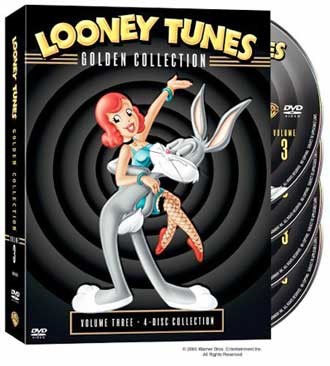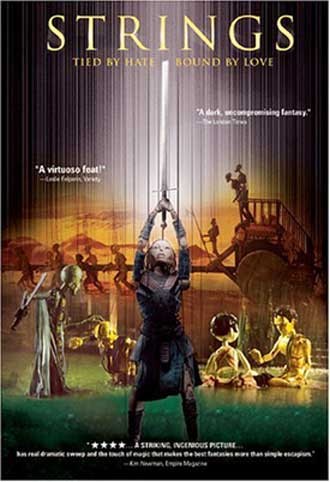Loonies, hand-drawn or human
Fans of vintage Warner Bros. cartoons wish it happened more than once a year, but the company’s annual Looney Tunes: Golden Collection is still something to celebrate. The new Volume 3 is another four-DVD, 60-toon treasure trove, this time featuring some real oddities among the bonus features, such as Philbert, a ’60s TV pilot that combines live action with a cartoon character. This volume makes a point of warning parents to think twice before showing it to kids: Some of these shorts have fun with racial sterotypes that have long since become touchy.
Also available from the WB, two cartoon titles of lesser historical import: Tom and Jerry Spotlight Collection 2, with 38 familiar cat-and-mouse routines, and The Looney Tunes Movie Collection, pairing two theatrical releases that bundled shorter cartoons (many available on the Golden Collections) into feature-length anthologies.
That other animation powerhouse, Disney, is more ambitious about its release schedule. While this studio also has a prestige series, Walt Disney Treasures, that only puts out a few titles a year (December 6 it will release Disney Rarities and The Chronological Donald, Vol. 2), the Mouse House is happy to bring out less elaborate compilations like the two new hour-long Classic Cartoon Favorites that focus on holiday themes.
Unlike WB, of course, feature-length titles are the studio’s bread and butter, even if at this point there are two iffy contemporary releases (Tarzan and The Emperor’s New Groove) for every classic like the Special Edition of Cinderella. The latter offers some pretty bizarre bonus features among the standard behind-the-scenes stuff, such as this shamelessly ridiculous bit of corporate cross-promotion: “Cinderella Stories from ESPN Classic,” hosted by renowned animation scholar Joe Namath.
More exotic animated titles have slipped onto shelves recently: In Fire and Ice (Blue Underground), Fritz the Cat director Ralph Bakshi delivers a sword-and-sorcery epic inspired by Frank Frazetta, the illustrator known for Conan the Barbarian and the most lavish T&A to ever adorn a sci-fi/fantasy paperback. Disc Two of the release contains a feature-length doc about Frazetta.
Strings (Wellspring) arrives in video stores just after causing a stir at Austin’s Fantastic Fest, where it was a surprise hit. Hailing from Denmark but employing the voices of English actors, it tells a familiar tale of good versus evil with one catch: All the characters are marionettes.
Paramount jumps in the animated fray with Beavis and Butt-Head: The Mike Judge Collection, which is nicely timed to whet our appetites for Judge’s coming-someday feature, Idiocracy. The three-disc set gathers 40 shorts picked by the filmmaker himself — the first installment of what he calls “the two-thirds that didn’t suck” — including many that were trimmed for broadcast or never saw airwaves at all. It also, naturally, offers music videos from everyone from Pantera to Wilco, all getting the B&B voiceover treatment.
Fox Home Video joins the Judge party with Office Space: Special Edition With Flair. Recognizing its status as a film that underperformed in theaters but has found a wide following on video, the new edition has a new doc, eight previously unseen deleted scenes, and (hide ’em from your boss!) screensavers and other stuff to do with your computer when you’re supposed to be writing a TPS Report.
Having moved into the live-action world now, let’s conclude with two movies — one old, one new — for which the adjective “cartoonish” isn’t an insult: Charlie and the Chocolate Factory (Warner) may have divided audiences, with some relishing and some being freaked out by Johnny Depp’s bizarre Willy Wonka, but it’s hard to argue with the delicious visuals concocted by Tim Burton and company. Deep Roy, the diminutive actor who plays all the Oompa-Loompas, is unsettlingly funny enough to fit right into some of the oddest Looney Tunes.
In The Jerk (Universal), now arriving in a (ahem) “26th Anniversary Edition,” Steve Martin does to the real world what Bugs Bunny did to the forest. This rags-to-riches-to-rags-to-riches tale is the definitive example of late-’70s goofiness and is available for the first time here in widescreen. Martin fans who despair over his recent films, from bland comedies to the leaden drama Shopgirl, could do a lot worse than revisiting this tale of a poor black child who grew up to corner the market on eyeglass handles. •
By John DeFore



